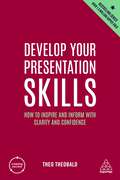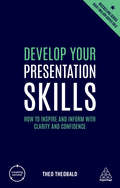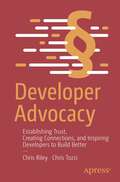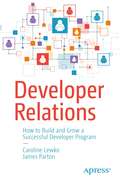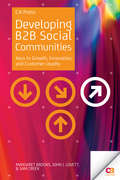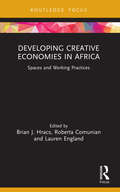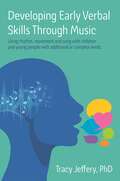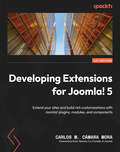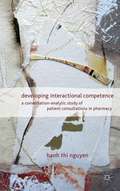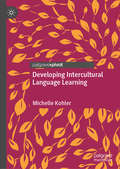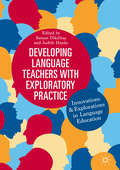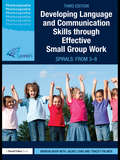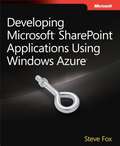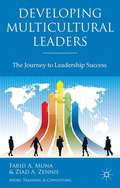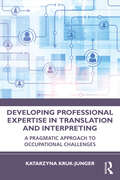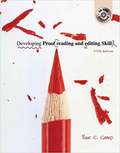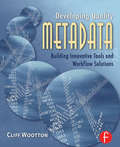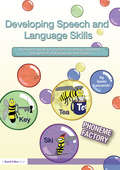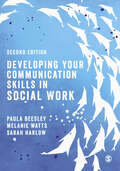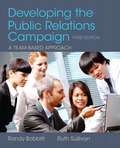- Table View
- List View
Develop Your Presentation Skills: How to Inspire and Inform with Clarity and Confidence (Creating Success #11)
by Theo TheobaldProvides step-by-step advice to prepare effectively and nail that presentation. This quick and easy guide provides a practical toolkit for developing a winning presentation and improving your confidence. Complete with case studies and expert input to help you avoid disaster, Develop Your Presentation Skills includes content to help you to deliver a presentation 'stripped bare' and to use new media to engage with your audience. This fully updated 5th edition now features even more practical exercises, useful templates and top tips to help you find your voice and use it with style; to inform, to persuade, to impress. From unpicking the original brief and understanding just what the audience wants, to facing your performance demons and constructing compelling content, you will keep your audience rapt with attention.The Creating Success series of books...Unlock vital skills, power up your performance and get ahead with the bestselling Creating Success series. Written by experts for new and aspiring managers and leaders, this million-selling collection of accessible and empowering guides will get you up to speed in no time. Packed with clever thinking, smart advice and the kind of winning techniques that really get results, you'll make fast progress, quickly reach your goals and create lasting success in your career.
Develop Your Presentation Skills: How to Inspire and Inform with Clarity and Confidence (Creating Success #68)
by Theo TheobaldDevelop Your Presentation Skills offers step-by-step advice to prepare effectively and nail that presentation. Going beyond just handling nerves and presenting slides, this quick and easy guide provides a practical toolkit for developing a winning presentation and improving your confidence along the way. From unpicking the original brief and understanding just what the audience wants, to facing your performance demons and constructing compelling content, you will keep your audience rapt with attention.Complete with anecdotes and expert input to help you avoid disaster, Develop Your Presentation Skills also includes content to help you to deliver a presentation 'stripped bare' and to use new media to engage with your audience. Fully updated for 2019, this 4th edition now features even more practical exercises, useful templates, and top tips to help you find your voice and use it with style; to inform, to persuade, to impress.The Creating Success series of books...Unlock vital skills, power up your performance and get ahead with the bestselling Creating Success series. Written by experts for new and aspiring managers and leaders, this million-selling collection of accessible and empowering guides will get you up to speed in no time. Packed with clever thinking, smart advice and the kind of winning techniques that really get results, you'll make fast progress, quickly reach your goals and create lasting success in your career.
Developer Advocacy: Establishing Trust, Creating Connections, and Inspiring Developers to Build Better
by Chris Riley Chris TozziNo matter which point you're currently at on the developer advocacy journey – whether you've already implemented a developer advocate function or you're exploring the possibility – this book is for you. This book provides actionable guidance that business and technology leaders can use to understand the benefits of advocacy, identify what goes into the function, and learn how to maximize the success of developer advocate teams.Developer advocacy is a role that is sometimes hard to quantify and build – but you feel it when you’re missing it. Companies are struggling to solidify advocacy despite a strong desire to do so and little guidance exists for businesses seeking to build a developer advocacy program or assess its effectiveness. This book will show you how to get an advocacy program in your business: the basics of having an advocacy program, what tasks and processes need to be set up, and how to identify key stakeholders. You'll see how companies of all types that sell to or engage with technical audiences can develop a developer advocacy strategy. Specifically, you'll learn what developer advocates do, how business can start an advocacy practice in your organization and how to scale and operationalize such a practice once it is in place. The book will further explore the metrics for measuring advocacy success and ways the scale advocacy teams internally and externally. The Power of Developer Advocacy explores the exciting career path of advocacy for developers and engineers. What You Will LearnDiscover what developer advocacy isDetermine which sorts of companies need the functionUnderstand what the primary strategic considerations for developer advocacy isWho This Book is For Existing and future advocacy leaders, would-be developer advocates, developer marketers and DevRel teams and leaders
Developer Relations: How to Build and Grow a Successful Developer Program
by Caroline Lewko James PartonIncreasingly, business leaders are either looking to start a new developer program at their company or looking to increase the impact of their existing DevRel program. In this context, software developers are finally recognized as legitimate decision makers in the technology buying process, regardless of the size of their organization. New companies are appearing with the sole purpose of making tools for developers, and even companies whose primary focus was elsewhere are waking up to the developer opportunity. Even as the need and demand for DevRel has grown, there are still re-occurring challenges for DevRel leaders. It is these challenges that this book addresses, covering all aspects of a DevRel program. It is an essential reference to professionalize the practice of developer relations by providing you with strategic, repeatable, and adoptable frameworks, processes, and tools, including developer segmentation and personas, and developer experience frameworks. In Developer Relations, you’ll find the answers to the following questions: How do we convince stakeholders to support a program?How do we go about creating a program?How do we make developers aware of our offer?How do we stand out from the crowd?How do we get developers to use our products?How do we ensure developers are successful using our products?How do we measure success?How do we maintain the support of our stakeholders? After reading this book you’ll have a clear definition of what developer relations is, the type of companies that engage in DevRel, and the scope and business models involved. What You Will Learn Discover what developer relations is and how it contributes to a company’s successLaunch a DevRel program Operate a successful program Measure the success of your programManage stakeholders Who This Book Is For Those interested in starting a new developer program or looking to increase the impact of their existing one. From executives to investors, from marketing professionals to engineers, all will find this book useful to realize the impact of developer relations.
Developing B2B Social Communities
by Margaret Brooks J. J. Lovett Sam CreekDeveloping B2B Social Communities: Keys to Growth, Innovation, and Customer Loyalty explains why business-to-business companies need a robust online community strategy to survive and flourish in today's changing economy and shows you how to design and execute your company's strategy successfully. Seminars, publications, market research, and customer care centers remain important tools in every B2B firm's toolbox for understanding, attracting, and serving customers while keeping them loyal. But in a world of fierce global price competition, increasing transparency of business practices, and ever-rising complexity, these traditional customer interaction channels are no longer enough for most B2B companies. That's why smart organizations--both large and small--are tapping into online communities to gain a huge competitive advantage: the ability to get much closer to customers and become more valuable to them. Developing B2B Social Communities delves into the generators of business value in online communities: immediate customer access to expert information within the company and from other customers; inexpensive delivery of custom technical help; demonstrations of how customers can to get the most from their products; and forums where customers can share tips, air gripes, reveal unmet needs, and suggest improvements. Three veteran community managers show you how to harness the knowledge of the crowd to help shape your company's strategic direction, develop new products and services, identify trends, sell more, serve customers more efficiently, and provide better product support. Fleshing out precepts with real-world examples and case studies, the authors detail the transformational opportunities--and pitfalls--for creating online communities. What you'll learn Why B2B companies of all sizes now need to make online communities an integral part of their operations to maintain or expand market share. How to create, launch, and manage customer communities. How to integrate communities into the business processes of an organization so they have the greatest impact. How to create clear strategies for the social community that support larger business goals. How to define and measure what you gain from hosting online communities. How to develop operational best practices that will provide the greatest ROI. Who this book is for This book is for all professionals in B2B organizations who are charged to improve customer service and loyalty, engage in ongoing research and collaboration with customers, increase sales, identify new product ideas, promote product utilization, provide superior customer service, or monitor industry trends. Readers who will benefit from Developing B2B Social Communities include community managers, C-level decision makers, strategy professionals, marketing directors and executives, customer care professionals, senior technology leaders, and actual and prospective community leaders. Table of Contents The Human Need to Connect Community as the Centerpiece of B2B Engagement Community Models Life Cycle and Maturity Models for Online Communities Community Management Case Study in Focus: CA Technologies Business Impact Through Community Developing B2B Social Communities
Developing Communication Skills
by Krishna Mohan Meera BanerjiDeveloping Communication Skills Text book by Krishna Mohan, Meera Banerji from Trinity Press, Laxmi Publication Pvt. Ltd., New Delhi.
Developing Creative Economies in Africa: Spaces and Working Practices (Routledge Contemporary Africa)
by Brian J. HracsBringing together the experience of academics and practitioners, this book discusses creative economies in Africa, focusing on changing dynamics related to working, co-working and clustering. The contributors in this volume examine how strategies and opportunities such as co-working spaces, clustering and hubs facilitate the emergence of creative industries in a range of African countries including Kenya, Uganda, South Sudan, Nigeria, Tanzania and South Africa. They also consider the importance of creative intermediaries in providing opportunities and platforms for the development of creative economies in Africa. The chapters present a range of case studies and practices that engage with how creative and cultural producers embrace some of the limits and challenges of their local context to creatively deliver opportunities for economic as well as social and cultural development in their cities and regions. This book will be of interest to students, scholars and professionals researching the creative economies in Africa across the humanities and social sciences. All the royalties from the publication of this book will be donated to the not-for-profit organisation The Craft and Design Institute (CDI) (https://www.thecdi.org.za/) in South Africa, supporting capacity building for young creative practitioners from disadvantaged backgrounds.
Developing Early Communication, Language and Learning Skills at Home: Creating Personalised Activity Packs for Parents
by Laura Osman Heidi ManouchehriDeveloping Early Communication, Language and Learning Skills at Home is full of tried-and-tested, practical activities for children developing their communication, language and learning skills including those with special educational needs and disabilities. This book provides parents, teachers and therapists with a range of playful and engaging activities to consolidate and develop children’s language and communication skills at home and school. Organised into five areas, the resource includes motivating activities around the themes of outdoor activities, daily routines, messy play, games for turn-taking and games to encourage creativity and make sense of the world. Features include: • 50 activities, each with a list of equipment, instructions, top tips, key vocabulary and ideas for extending the activity next time • Symbol boards for each activity to support children’s understanding and experiences • Photocopiable sheets for ease of use • Guidance on how to tailor activities to the interests and needs of the child to produce a personalised activity pack • An activity checklist to help you maximise your interactions with the child • An activity log to record children’s responses and achievements With clear and easy-to-follow instructions, the activities are suitable for use with children who are non-verbal, still developing their early communication or children who are talking. This is an invaluable resource for teachers, teaching assistants or therapists to share relevant activities with parents, and can equally be used by parents as a stand-alone resource. Designed to support the transfer of learning from school to home, this book will empower anyone working with children with SEND to develop children’s communication, language and learning through playful interactions.
Developing Early Verbal Skills Through Music: Using rhythm, movement and song with children and young people with additional or complex needs
by Tracy JefferyDrawing on current research about the connections between music and speech, this book explains how and why musical activities can be used to support the mechanisms and processes needed for speech. Containing specific guidance on the physiological, neurological, and learning differences children face when trying to make sense of speech, including hypermobility, autism spectrum conditions, Down Syndrome, auditory processing differences and motor timing difficulties, this guide provides an in-depth evaluation into how you can enhance your practice.Discover evidence-based and easy-to-use activities such as how to use whistles for breathing, drums to support the ability to 'hear' or produce speech sounds, and how to use songs to support speech.
Developing Extensions for Joomla! 5: Extend your sites and build rich customizations with Joomla! plugins, modules, and components
by Carlos M. MoraHarness the full potential of Joomla! through this comprehensive take on Joomla! extensions from conception through to releaseKey FeaturesDiscover the complete cycle of extension development from conception to releaseLeverage built-in features such as categories, ACL, and custom fields to enrich your extensionsLearn how to build extensions that integrate with the Joomla! API and the new Joomla! CLIPurchase of the print or Kindle book includes a free PDF eBookBook DescriptionJoomla! 5 is a groundbreaking CMS that helps you take a significant leap into the world of content management systems. Joomla! 5 features a variety of impressive new features that align with current web standards and enable you to experience lightning-fast performance for optimal web page optimization, leverage the new code architecture, and tap into the WebService API, among others. This book takes you on a journey of extending Joomla's capabilities by developing your own extensions. The chapters not only explain the key concepts behind Joomla's architecture but also equip you with the latest techniques for crafting components and plugins. You’ll discover how to leverage existing features within Joomla! to empower your extensions and create tailored solutions. The book takes you from the initial stages of planning your extension development to a fully featured finished product. As you advance, you'll learn invaluable techniques for testing your extension, addressing common issues, and preparing it for publication. The concluding chapters of this comprehensive guide teach you how to test your extension for common issues, along with how to publish the extension for everyone to use. By the end of this book, you’ll have the confidence and skills to complete the cycle of extension development.What you will learnFind out how to plan the development of a new extension from scratchUnderstand the basic structure of a Joomla! extensionGet to grips with the Joomla! Forms systemUse Joomla! features effectively to enrich your extensionsDiscover how to add a WebService API to your extensionCreate a Joomla! CLI command for your extensionDevelop a Joomla! Child Template for your projectsTest your extensions before the releaseWho this book is forThis book is for Joomla! developers and web designers who want to extend the functionalities of Joomla! and find innovative ways to customize their content management systems, e-commerce websites, business websites, and more. Basic familiarity with Joomla! will help you get the most out of this book.
Developing Healthy Relationships: A Guide for Singles
by Jeff ParzialeWhat is holding you back from a healthy deeply fulfilling relationship?
Developing Interactional Competence
by Hanh Thi NguyenAn unprecedented glimpse into the multidimensional learning processes that take place when novice professionals develop the necessary communication skills for effective task accomplishment. This analysis of authentic patient consultations by pharmacy interns is a significant contribution to research on health communication training.
Developing Intercultural Language Learning
by Michelle KohlerThis book presents a detailed account of a self-study in which the author considers why a developmental perspective matters in language learning within an intercultural orientation, and how teachers of languages might understand and attend to this notion in their work. The discussion is based on the author’s experience as a teacher-researcher and traces aspects of teachers’ work from planning, teaching and mediating, to assessing and judging evidence of student learning and development over time. This book is grounded in a praxis view of language teaching and learning and will be of interest to other language teachers, pre-service teachers, teacher trainers and applied linguists.
Developing Language Teachers with Exploratory Practice: Innovations and Explorations in Language Education
by Judith Hanks Kenan DikilitaşThis edited collection explores the use of Exploratory Practice (EP) by language teachers in classrooms. Written by practitioners, the chapters showcase unique examples of each principle of EP, with topics ranging from mentoring practitioner researchers, to teaching and learning in EAP, and investigating curriculum development in language teaching programs. The book provides example EP studies and gives voice to practitioners’ experiences of the challenges they experienced as well as the benefits. Examples include tackling intercultural communication in linguistically and culturally diverse classrooms; pedagogy and curriculum design in language teaching; explorations of continuing professional development in language education. In doing so, it offers tools that can be transferred to other classroom contexts and used to aid teacher development. The concluding chapter highlights critical aspects of Exploratory Practice which emerge in the studies and examines how practitioners advanced their understandings. This book will appeal to those working in Applied Linguistics, TESOL research, as well as language teachers and teacher educators.
Developing Language and Communication Skills through Effective Small Group Work: SPIRALS: From 3-8
by Marion Nash Jackie Lowe Tracey PalmerFirst published in 2011. Routledge is an imprint of Taylor & Francis, an informa company.
Developing Microsoft® SharePoint® Applications Using Windows Azure™
by Steve FoxYour expert guide to building Microsoft® SharePoint® applications in the cloud Deliver custom, cloud-based business solutions using SharePoint 2010 and Windows AzureTM together. By applying hands-on techniques from Microsoft cloud development expert Steve Fox, you'll learn how to increase the reach, resource capability, and reusability of your apps. Get the practical code exercises and solid advice you need--whether you're planning to build complete data-driven applications or hybrid solutions with simple Web parts. Discover how to: Deliver data from Windows Azure Marketplace DataMarket into SharePoint and Microsoft Office applications Use Microsoft Business Connectivity Services to connect to SQL AzureTM data Create advanced web parts to surface SQL Azure data in BingTM Maps, using the SharePoint client object model Manage files in Windows Azure using BLOB storage Deploy Windows Communication Foundation (WCF) services to Windows Azure Build business intelligence solutions, using SQL Azure, Microsoft SQL Server® Reporting Services (SSRS) Get code samples on the web Ready to download at http://go.microsoft.com/FWLink/?Linkid=0 00000. For system requirements, see the Introduction.
Developing Multicultural Leaders
by Farid A. Muna Ziad A. ZennieThe authors identify three stages of leadership development - the early ingredients for success starting from childhood, the paths that current and aspiring leaders should follow once they start a career, and what leaders should do exceptionally well to become and remain outstanding in organizations operating in multicultural environments.
Developing Multicultural Leaders
by Farid A. Muna Ziad A. ZennieThe authors identify three stages of leadership development: the early ingredients for success starting from childhood; the paths that current and aspiring leaders should follow once they start a career; and what leaders should do exceptionally well to become and remain outstanding in organizations operating in multicultural environments.
Developing Professional Expertise in Translation and Interpreting: A Pragmatic Approach to Occupational Challenges
by Katarzyna Kruk-JungerDeveloping Professional Expertise in Translation and Interpreting covers what professional expertise means for translators and interpreters in the fast-changing, globalised world and how it can be achieved in practice.The book offers tactics and solutions for everyday issues, such as competence, etiquette, cultural differences, the translator’s role in communication, dealing with mistakes and using new technologies, using real-life examples of the occupational challenges practitioners face in their line of work. These range from translating Donald Trump’s controversial political tweets or interpreting during Oscar Pistorius’ high-profile court trial.This user-friendly guide helps students in translator training, or professionals starting out as translators and interpreters, establish good working standards and offers pragmatic solutions to common professional dilemmas for more experienced translators and interpreters.This is also an ideal resource for professors creating curricula in the area of ethics and etiquette within translation and interpreting, offering an interdisciplinary approach and an overview of the literature regarding all key topics.
Developing Proofreading And Editing Skills
by Sue C. CampDeveloping Proofreading and Editing Skills, 5/e by Camp provides instruction and applications designed to sharpen skills in detecting and correcting errors in written communications including memos, letters, reports, email messages, databases, presentation slides, advertisements, and spreadsheets. The material progresses from easy-to-recognize errors to those more difficult to spot, allowing students to build confidence and skill. Highlights of the 5th edition include a discussion of voice-recognition technology and proofreading and editing, end-of-chapter text applications with two applications in each chapter available on CD-ROM, and a series of seven review modules offering challenging proofreading practice.
Developing Quality Metadata: Building Innovative Tools and Workflow Solutions
by Cliff WoottonWith the explosion of new audio and video content on the Web, it's more important than ever to use accurate and comprehensive metadata to get the most out of that content. Developing Quality Metadata is an advanced user guide that will help you improve your metadata by making it accurate and coherent with your own solutions. This book is designed to get you thinking about solving problems in a proactive and productive way by including practical descriptions of powerful programming tools and user techniques using several programming languages. For example, you can use shell scripting as part of the graphic arts and media production process, or you can use a popular spreadsheet application to drive your workflow. The concepts explored in this book are framed within the context of a multimedia professional working on the Web or in broadcasting, but they are relevant to anyone responsible for a growing library of content, be it audio-visual, text, or financial.
Developing Speech and Language Skills: Phoneme Factory
by Gwen LancasterThis book is part of the Phoneme Factory Project undertaken by Granada Learning in partnership with the Speech and Language Therapy Research Unit (SLTRU) in Bristol. It aims to provide guidance for teachers, SENCos, SLTs and parents regarding: criteria for referral to speech and language therapy phonological disorders appropriate intervention approaches that can be used in the classroom and at home. Complementing the book is a CD containing downloadable resources including a picture library for the classroom and the home, as well as checklists and other time-saving documents.
Developing Your Communication Skills in Social Work
by Paula Beesley Melanie Watts Sarah HarlowThis book explores: · What is meant by communication skills · What communication skills are · What they look like in practice · The differences in communicating with service users and professionals, such as children, guardians, peers and emergency workers · Why they are important It includes a wide range of theories, multiple case studies, reflective tasks, and exercises. It will develop your critical thinking and reflection skills, and help you develop your own communication style. Presented in a chronological style which acts as a working tool that you can dip into and out of. Each chapter is structured in a way that encourages you to build on your knowledge, so it begins by taking you right back to basics to learn core theory and practice techniques before getting you to critically reflect on the use of different skills in different settings and with different service user groups. The end-of-chapter skills audits help you to reflect on what you have learnt, what your strengths are and what you need to work on more.
Developing Your Communication Skills in Social Work
by Paula Beesley Melanie Watts Sarah HarlowThis book explores: · What is meant by communication skills · What communication skills are · What they look like in practice · The differences in communicating with service users and professionals, such as children, guardians, peers and emergency workers · Why they are important It includes a wide range of theories, multiple case studies, reflective tasks, and exercises. It will develop your critical thinking and reflection skills, and help you develop your own communication style. Presented in a chronological style which acts as a working tool that you can dip into and out of. Each chapter is structured in a way that encourages you to build on your knowledge, so it begins by taking you right back to basics to learn core theory and practice techniques before getting you to critically reflect on the use of different skills in different settings and with different service user groups. The end-of-chapter skills audits help you to reflect on what you have learnt, what your strengths are and what you need to work on more.
Developing the Public Relations Campaign: A Team-Based Approach (3rd Edition)
by Randy Bobbitt Ruth Sullivan<p>Written for students taking advanced courses in public relations, the book takes a team project approach to learning about the field. The book introduces a three-step process—the PIE chart—that more accurately reflects the campaign development process used in the real world. Exercises and case studies in every chapter guide students through the development of their own public relations campaigns. <p> <p>Upon completing this book, readers will be able to: <p> <li>Develop their own public relations campaigns <li>Apply public relations skills to the real world <li>Understand how to apply communication theories to public relations</li>
